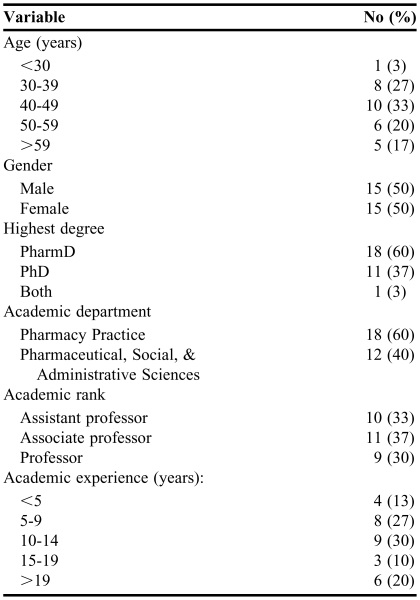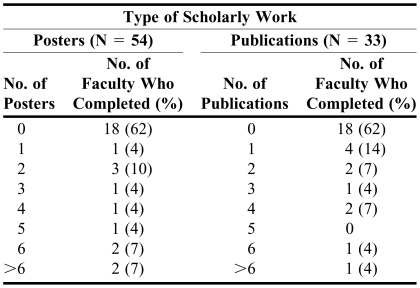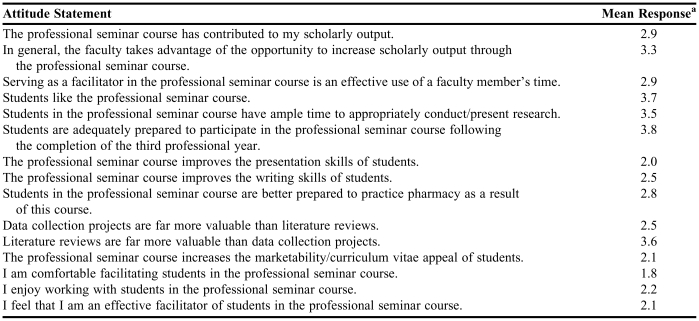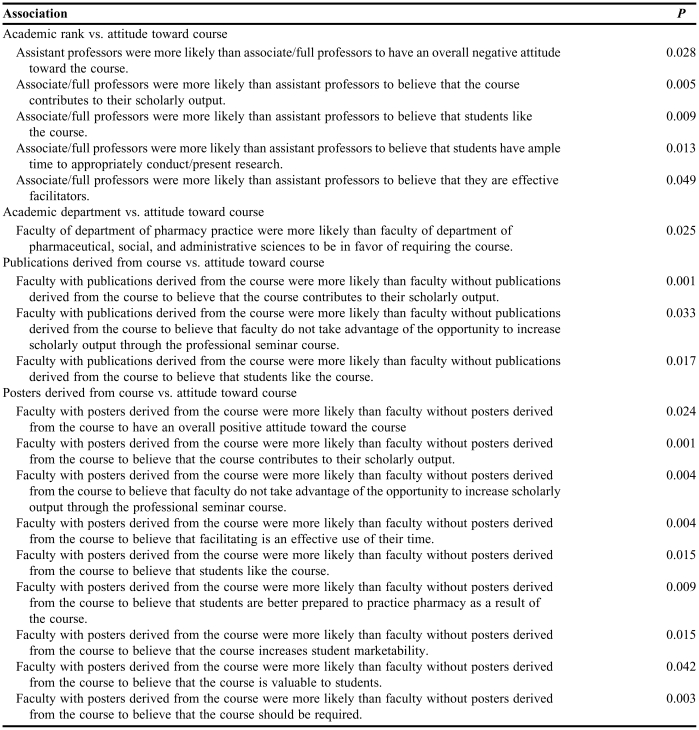Abstract
Objectives
To determine faculty attitudes toward a professional seminar course for PharmD students, document scholarly production derived from the course, and ascertain whether that scholarly production or other faculty characteristics affected attitudes toward the course.
Methods
Faculty members served as facilitators for pharmacy students enrolled in a professional seminar course. A 34-item survey instrument intended to identify faculty attitudes toward the course and document scholarly productivity was developed. All 40 faculty facilitators involved in the course were asked to complete the survey instrument.
Results
Of the 30 (75%) faculty members who completed the survey instrument, 20 had an overall positive attitude toward the course. Faculty members had generated approximately 90 peer-reviewed scholarly works over a 9-year period as a result of the course. Significant associations were found between faculty members' attitudes toward the course and academic rank, academic department, and scholarly production derived from the course.
Conclusions
Faculty members who had advanced academic rank, an appointment in the pharmacy practice department, and scholarly productivity as a result of serving as a facilitator for a Professional Seminar Course were more likely to have positive attitudes toward the course.
Keywords: faculty productivity, research, scholarship, survey
INTRODUCTION
Since 1997 the McWhorter School of Pharmacy (MSOP) at Samford University has required final year doctor of pharmacy (PharmD) degree candidates to complete a 2-course sequence known as Professional Seminar I and II. In this course sequence, students are guided by faculty facilitators to develop an original question relevant to the field of pharmacy, answer that question through means of data collection (eg, retrospective chart review, survey) or literature synthesis, develop and deliver a poster or platform presentation, and write a final manuscript. Thus, course objectives are to teach students the research process and to advance their oral and written presentation skills. In those circumstances in which the faculty member has worked in a highly collaborative manner with the student and the project is of sufficient quality, co-authored poster presentations and/or published manuscripts have been generated, thus benefiting both the faculty member and the student. There has been little documentation of similar courses in other US pharmacy schools, the scholarly value of these courses, and faculty and student attitudes toward these courses. One study found that 10 of 41 (24%) responding PharmD programs required student-conducted research, 18 (44%) had electives in research, and 13 (32%) did not have a research requirement.1 Of the 10 programs that required a research project, 4 required students to develop a written proposal only, 4 required students to additionally collect and analyze data and prepare a written report, and 2 went farther, requiring students to present findings at college level or beyond. In general, respondents felt that courses/coursework dealing with research were valuable for students and should be a minimal requirement of PharmD programs.
The value of these courses as perceived by both faculty and students has been studied previously.2,3 A survey conducted with graduates from the University of Arizona revealed that more than one-third of respondents had actually published a manuscript and/or presented their work at a professional meeting.2 Responses to attitudinal statements showed agreement that completing a project was a valuable experience, that the project developed skills useful in pharmacy work, that the school should continue to require student projects, and that all US PharmD students should be required to conduct an evaluative project. A survey of the University of Arizona faculty using similar attitude statements offered insight into faculty members' perceptions of required projects.3 Strongest agreement was seen in the areas of the senior project improving the students' presentation, writing, and analytical skills. There was general agreement that the required projects were beneficial, though not as much so to participating faculty or the department in terms of providing research assistance or increasing scholarly output, respectively.
To our knowledge there have been no attempts to associate faculty scholarly output derived from professional seminar courses and attitudes toward these courses. Furthermore, faculty members have diverse backgrounds that may influence attitudes toward these courses. Thus, the objectives of this study were to determine faculty attitudes toward a professional seminar course, to document their scholarly production derived from the course, and ascertain whether that scholarly production or other faculty characteristics affect attitudes toward the course.
METHODS
The Professional Seminar Course is a required course taken during the final year of the PharmD program. Each faculty member involved in the course facilitated approximately 3 students per year. A survey instrument was developed based in part on the previous work by Murphy.2-3 The survey consisted of 5 distinct areas: faculty demographics; quantification of peer-reviewed scholarly output related to the course; attitude statements regarding the course; faculty recommendations for the course; and perceived value statements concerning the course. Faculty members were asked to respond to positively and negatively worded statements concerning the course using a Likert-style scale on which 1 = strongly agree, 2 = agree, 3 = neutral, 4 = disagree, and 5 = strongly disagree. Negatively worded attitude statements were inverted to facilitate scoring and statistical analyses. Faculty members were questioned regarding whether the course should continue to be required or discontinued, changed into an elective course, or required with alterations. Finally, faculty members assigned an overall value to the course using a 0-to-10 scale, with zero equating to “no value” and 10 equating to “extreme value.” After finalization, the survey received approval through Samford University's Institutional Review Board and was administered to the MSOP faculty at a required faculty meeting.
Associations between faculty characteristics and attitudes as well as scholarly output and attitudes were explored by statistical analyses performed via the Minitab Statistical Software, Release 14.1. Differences between groups on attitude scale measures were accomplished with two-independent groups Student t tests and on proportions with a chi-square or Fisher's exact tests (ie, z-tests for 2 independent proportions). Because of the ordinal nature of the attitude scale data, the results of all t tests were corroborated with the Mann-Whitney-Wilcoxon test for 2 independent medians. Statistical significance was established at p < 0.05.
RESULTS
Thirty (75%) of MSOP's faculty members completed the survey instrument. Faculty demographic variables are shown in Table 1. Total course-related scholarly production of responding faculty members is outlined in Table 2. Of the 29 faculty members providing data on scholarly productivity resulting from serving as a facilitator for the course, 11 (38%) individuals generated a peer-reviewed original research article or review article. In addition, 11 (38%) individuals presented a peer-reviewed poster at a local, national, or international conference. Over half (n = 15) of the faculty members reported no scholarly works of any kind associated with serving as a facilitator for the course. The majority of faculty members cited that the primary obstacles preventing the generation of scholarly work were a lack of student interest and a lack of time for adequate faculty input.
Table 1.
Demographics of Faculty Members Serving as Facilitators for a Professional Seminar Course (n = 30)
Table 2.
Peer-reviewed Scholarly Works Generated From a Professional Seminar Course (N = 29)
The mean attitude responses of all faculty respondents for individual attitude items are presented in Table 3. The mean attitude response when considering all faculty respondents was positive for 10 of 15 items. When averaging all 15 attitude items for each faculty member, 20 of 30 respondents had an overall positive attitude toward the course. Faculty members, on average, were agreeable that the course sequence contributed to their scholarly output, that facilitating students was an effective use of their time, and that they genuinely enjoyed serving as facilitators and felt they were effective in facilitating student-led research. They also agreed that the course improved students' writing and presentation skills as well as their marketability and their ability to practice pharmacy after graduation. However, faculty members disagreed, on average, that MSOP faculty members took advantage of this course to increase their scholarly production. In addition, responding faculty members believed that students did not like participating in the course and that they were neither well-equipped to conduct the research nor had the time to complete research in an appropriate manner. In terms of the methodologies involved in conducting research, respondents favored conducting data collection projects over literature review projects.
Table 3.
Faculty Attitudes Toward a Professional Seminar Course (n = 30)
aA response of 3 was a neutral response, less than 3 was a positive response, and greater than 3 was a negative response
Fifteen (50%) of the faculty respondents expressed that the course should remain a requirement for MSOP students. Nine (30%) recommended that the course should be changed into an elective course, 4 (13%) recommended that course should be required only if the course was altered from its current form, and 2 (7%) recommended that the course should be discontinued entirely. When questioned regarding the value of the course to students and faculty members, the faculty members responded with a mean response of 5.0 for students (range 0-9) and 5.1 for faculty (range 0-10).
A significant correlation was found between faculty attitudes and either faculty characteristics or scholarly production from the course (Table 4). In particular, associate/full professors were more likely than assistant professors to have positive attitudes toward the course. Also, those faculty members with posters and/or publications derived from the course were more likely to view the course in a positive manner relative to those without this scholarly output. Faculty members of the department of pharmacy practice were more likely than members of the department of pharmaceutical, social, and administrative sciences to favor requiring the course for students.
Table 4.
Significant Associations Found in Faculty Responses on a Survey Regarding a Required Professional Seminar Course
DISCUSSION
The professional seminar course at MSOP has produced an estimated 1000 projects over a 9-year period, with approximately 9% of these resulting in scholarly output for faculty members. While this percentage is somewhat low, the production of almost 90 scholarly works for faculty members as a result of the course should not be considered inconsequential, especially for a private school of pharmacy that consistently emphasizes teaching as the top priority for faculty members.
Interestingly, while the majority of faculty members had an overall positive attitude toward the course, they judged that the course provided only a moderate level of value to both faculty members and students and only half of the faculty believed that the course should be required in its current form. This apparent discrepancy may be explained by the workload associated with the course. For example, in contrast to Murphy's finding that faculty respondents who had served as a primary advisor in the senior project course had supervised an average of only 5.4 ± 5.7 students (range 1-20) since establishment of the course,3 each faculty member of MSOP must facilitate 3-4 students per year. Considering the magnitude of facilitated projects, the perception of lack of student interest in pursuing a publication/poster, and the constraints on faculty time and resources, additional frustrations may exist for MSOP faculty members that counterbalance the perceived positive attributes of the course.
Attitudinal differences between assistant professors and associate/full professors were fairly striking. Assistant professors may not appreciate the potential value of the course to their own scholarly production, may not have developed successful strategies to guide students toward outstanding work, or may feel too overwhelmed with other teaching responsibilities to dedicate the necessary time and energy to the course. Although faculty members of the department of pharmacy practice were more likely than faculty members of the department of pharmaceutical, social, and administrative sciences to be in favor of requiring the course, we were somewhat surprised that there were not more attitudinal differences between the 2 academic departments. Our hypothesis was that those faculty members with PhDs (in the department of pharmaceutical, social, and administrative sciences) would have more frustration with the course because of the nature of the projects involved. Those completing the requirements of a PhD program experience a demanding dissertation project as opposed to the very limited scope of projects performed in a professional seminar course. Also, it appears easier for members of the department of pharmacy practice to guide students toward retrospective chart reviews at their practice sites and/or clinically oriented literature reviews within their areas of expertise.
Faculty members with peer-reviewed publications and/or posters derived from the course were more likely to possess positive attitudes toward the course. Given the amount of time and energy that faculty members dedicate to facilitating student projects, it should not be surprising that faculty attitudes would be influenced by whether or not they experience personal benefit from the process. Clearly, some MSOP faculty members have successfully integrated their individual scholarly programs into the course while others have not. Thus, the real question is whether faculty members view the course as a teaching-related activity only or a unique opportunity to combine teaching with scholarly activities.
Finally, while our project focused on the specific aspect of faculty scholarly production derived from the professional seminar course and how that affects attitudes toward the course, it is the aforementioned student-centered course objectives that are of paramount concern. In other words, the course has merit regardless of faculty scholarly production. Of course, when outstanding projects are brought to fruition in terms of peer-reviewed posters and publications, then additional benefits beyond those involving course objectives are realized for both students and faculty members.
CONCLUSION
This study found that serving as a facilitator in a professional seminar course generated scholarly work among faculty members at MSOP. Most faculty members had overall positive attitudes toward the course; however, faculty members who had advanced academic rank, an appointment in the pharmacy practice department, and scholarly production derived from the course were more likely to have positive attitudes toward the course.
REFERENCES
- 1.Murphy JE, Peralta LS, Kirking DM. Research experiences and research-related coursework in the education of doctors of pharmacy. Pharmacotherapy. 1999;19:213–20. doi: 10.1592/phco.19.3.213.30931. [DOI] [PubMed] [Google Scholar]
- 2.Murphy JE, Valenzuela R. Attitudes of doctor of pharmacy graduates of one U.S. college toward required evaluative projects and research-related coursework. Pharm Educ. 2002;2:69–73. [Google Scholar]
- 3.Murphy JE. Faculty attitudes toward required evaluative projects for doctor of pharmacy candidates. Am J Pharm Educ. 1997;61:73–8. [Google Scholar]






